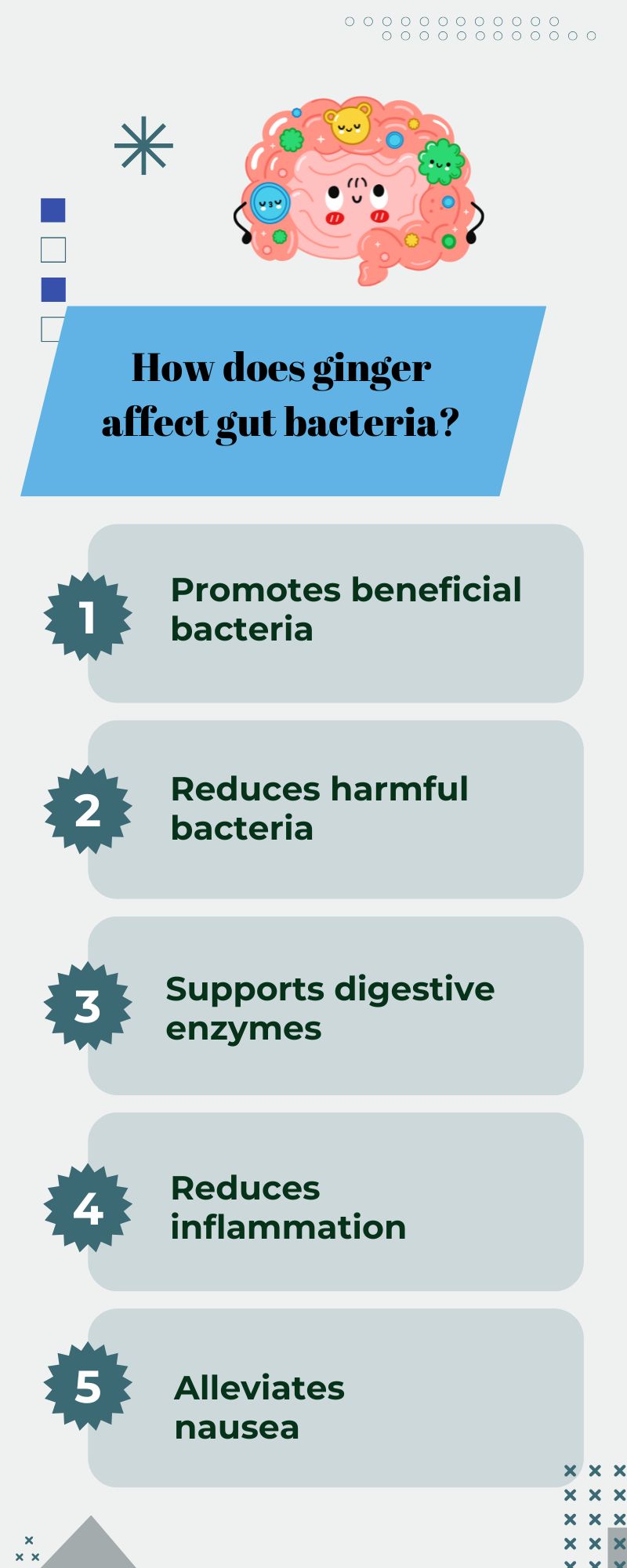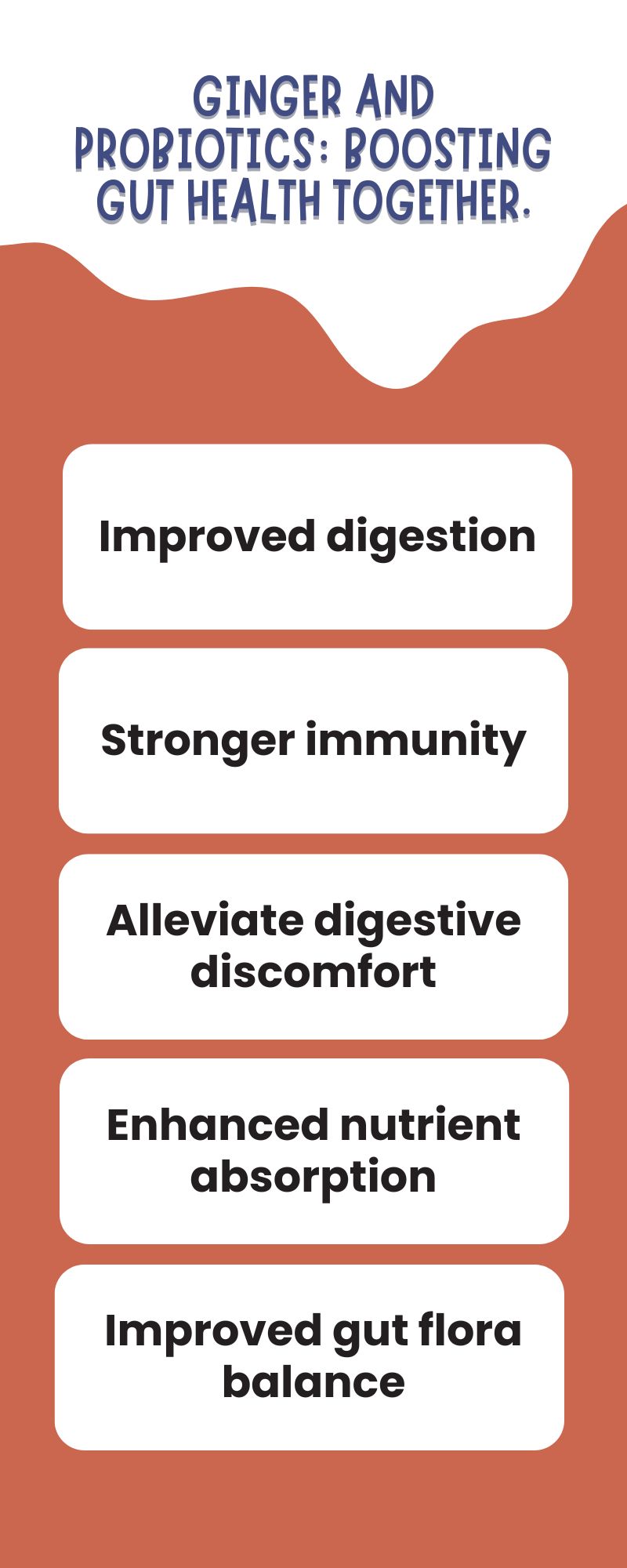Key takeaways
-
Ginger and probiotic drinks work together to improve digestion, reduce bloating, and support a balanced gut microbiome
-
Ginger promotes beneficial bacteria and inhibits harmful ones, while probiotics replenish good bacteria in the gut
-
Probiotic drinks like kefir, kombucha, and yogurt drinks provide live bacteria to enhance digestion and overall wellness
-
Adding both ginger and probiotics to your routine can reduce inflammation, improve nutrient absorption, and support immune health
-
Be mindful of moderation; excessive ginger can cause digestive upset, and probiotics may cause temporary bloating as your body adjusts
Gut health is something that affects all of us, whether it’s dealing with occasional bloating, digestive discomfort, or more persistent issues like acidity or irregular bowel movements. We often look for solutions to ease these problems without turning to medications. If you’re looking for a natural way to improve your digestion, ginger might be just what you need. This powerful spice has been used for centuries to aid digestion, and when combined with probiotic drinks, it can provide even greater benefits.
In this blog, we’ll explore how ginger supports gut bacteria and how probiotic drinks can enhance its effects for better digestive health.
What is ginger?
Ginger (Zingiber officinale) is a popular root used worldwide, not only as a flavorful spice but also as a natural remedy for multiple health problems. It’s well-known for its digestive properties, especially for reducing nausea and soothing the stomach. But what makes ginger so powerful for gut health?
Ginger contains compounds like gingerol and shogaol, which are known for their anti-inflammatory and antioxidant properties. These compounds play an important role in promoting digestive health by reducing bloating, improving digestion, and soothing the gastrointestinal tract.
With these benefits, ginger is an excellent natural option for boosting digestion and promoting a healthy gut. Now that we understand what ginger is, let’s get into how it specifically impacts gut bacteria.
How does ginger affect gut bacteria?

The bacteria in your gut have a major impact on your overall health, affecting everything from digestion to immunity. Ginger can influence your gut bacteria in a positive way, supporting the growth of beneficial bacteria while inhibiting harmful ones. Here’s how ginger affects your gut microbiome:
-
Promotes beneficial bacteria
Ginger helps stimulate the growth of good bacteria in your gut, promoting a balanced microbiome. This balance is important for digestion and optimal immune function.
-
Reduces harmful bacteria
Ginger has natural antimicrobial properties that help limit the growth of harmful bacteria in your digestive system. This balance is key to preventing gut-related issues like bloating and inflammation.
-
Supports digestive enzymes
Ginger also boosts the production of digestive enzymes, helping break down food more efficiently and ensuring better absorption of nutrients.
-
Reduces inflammation
Ginger has anti-inflammatory properties that help soothe the digestive tract, reducing symptoms of inflammation-related gut issues such as IBS.
-
Alleviates nausea
Ginger is well-known for its ability to reduce nausea and discomfort in the stomach, making it a great natural remedy for digestive upset.
Incorporating ginger into your routine can help foster a healthier gut microbiome, improving your overall digestive health.
For quick relief from bloating and inflammation, check out our blog on “12 Ways to Get Unbloated Fast in 5 Minutes” and discover effective tips to reduce bloating in just a few minutes.
Let’s now discuss probiotic drinks and their role in gut health.
What are probiotic drinks?
Probiotic drinks are beverages filled with live beneficial bacteria, which support the gut by replenishing or maintaining a healthy microbiome. Common examples of probiotic drinks include kefir, kombucha, and yogurt drinks. These drinks are packed with probiotics, which promote a balanced microbiome and offer health benefits when consumed regularly, supporting digestion and overall wellness.
-
Kefir
A fermented milk drink rich in a variety of probiotics, kefir promotes healthy digestion by restoring and balancing the gut microbiome. It contains beneficial bacteria and yeast that aid in the breakdown of lactose, making it easier to digest, even for those with mild lactose intolerance. Kefir is also rich in essential vitamins and minerals like calcium, magnesium, and B vitamins, which support overall health.
-
Kombucha
Kombucha is a fermented tea packed with beneficial bacteria and yeast. It’s known for its detoxifying properties, helping your body cleanse and remove toxins. It also supports digestion by improving gut flora balance and reducing bloating or indigestion. Kombucha’s unique blend of probiotics and antioxidants, like polyphenols from tea, helps to reduce inflammation and supports immune health by promoting a stronger gut barrier.
-
Yogurt drinks
Yogurt drinks, like drinkable kefir, are made from fermented milk and contain live probiotic cultures. These drinks are particularly beneficial for individuals with lactose intolerance because the fermentation process breaks down most of the lactose. Yogurt drinks are a good source of probiotics, which help improve digestion by promoting healthy gut bacteria. They also contribute to better nutrient absorption and support immunity due to their high content of vitamins and minerals.
-
Probiotic shots
Probiotic shots are quick, easy drinks packed with probiotics and other gut-friendly ingredients like ginger, turmeric, and lemon to give your digestion a boost. If you’re looking for a fast way to support your gut health, try The Good Bug’s Gut Cleanse | 14 Prebiotic Colon Detox Shots. This 14-day detox helps clear out waste, reduce bloating and gas, and give you a refreshed feeling. Plus, it helps balance your gut and boost energy!
Probiotic drinks introduce beneficial bacteria into your gut, enhancing digestion and supporting overall gut health.
Now, let's look at the combined benefits of ginger and probiotic drinks for your gut.
The combined benefits of ginger and probiotic drinks for gut health

When combined, ginger and probiotic drinks work synergistically to enhance gut health. This powerful duo offers a range of digestive and overall health benefits:
-
Improved digestion
Ginger helps break down food, while probiotics introduce good bacteria that help ferment undigested food particles. Together, they promote better digestion and reduce bloating.
-
Stronger immunity
A balanced gut microbiome is linked to stronger immunity. Ginger’s antioxidant properties and the beneficial bacteria in probiotics help protect the body from infections and support immune health.
-
Alleviate digestive discomfort
Ginger’s anti-inflammatory properties, paired with the soothing effects of probiotics, can help alleviate common digestive issues like IBS, constipation, and acid reflux.
-
Enhanced nutrient absorption
The combination of ginger and probiotics can improve nutrient absorption in your gut, helping your body effectively absorb the vitamins and minerals it requires.
-
Improved gut flora balance
Ginger helps support the growth of beneficial bacteria while limiting harmful bacteria, and probiotics help replenish good bacteria, promoting a healthy and balanced gut microbiome.
Adding both ginger and probiotic drinks to your diet can provide enhanced support for a healthy gut microbiome and better digestion.
Also read: Easy Homemade Ginger Kombucha Drink Recipe
Next, let's see how you can easily incorporate both into your routine.
How to incorporate ginger and probiotic drinks into your diet
Incorporating both ginger and probiotic drinks into your daily routine is easy. Here are some practical ideas:
-
Ginger tea with probiotics
Brew a warm cup of ginger tea by boiling a few slices of fresh ginger in water. Pair it with a probiotic drink like kefir or kombucha. This combo helps soothe your stomach, reduce bloating, and support digestion with the benefits of both ginger and probiotics.
-
Ginger-infused smoothies
Add fresh ginger or ginger powder to your smoothies, along with a probiotic-rich ingredient like yogurt or kefir. This combination will boost your digestive health, improve nutrient absorption, and keep your gut happy.
-
Ginger water
Start your morning with a glass of ginger-infused water. Simply add a few slices of ginger to warm water and let it steep for a few minutes. Drinking this first thing helps kick-start digestion. Follow it up with a probiotic drink later in the day for continuous gut support.
-
Probiotic kombucha with ginger
Enjoy ginger-flavored kombucha for a refreshing, fizzy drink that combines the benefits of probiotics and ginger. It helps with digestion, boosts immunity, and reduces inflammation in your gut.
-
Homemade ginger and probiotic shots
Make a quick ginger shot by blending fresh ginger juice with lemon and honey. After the shot, drink a probiotic beverage like kefir or kombucha. This quick combo gives your gut an instant health boost.
Incorporating these simple practices into your daily routine can significantly improve your digestive health.
For more tips on managing acidity, check out this video: "" for practical, science-backed strategies to help balance your gut and soothe acidity.
Let’s now consider potential side effects and precautions.
Possible side effects and considerations
While both ginger and probiotic drinks offer numerous health benefits, it’s important to be mindful of a few potential side effects:
Ginger
-
Excessive consumption of ginger may cause mild digestive upset, such as heartburn or diarrhea
-
People with certain conditions, such as gallstones or bleeding disorders, should definitely consult a healthcare professional before consuming large amounts of ginger
Probiotic drinks
-
Some people may experience mild bloating or gas when first introducing probiotics into their diet. This is usually temporary as the body adjusts
-
Individuals with dairy intolerance may want to opt for non-dairy probiotic drinks like kombucha or coconut-based kefir
Please note: If you’re on antibiotics, it’s best to consult a doctor before consuming probiotics to ensure they don’t interfere with the treatment.
Moderation is key when incorporating both ginger and probiotics into your diet, especially if you have underlying health conditions.
Ginger and probiotic drinks are both excellent natural solutions for improving gut health. When combined, they work together to enhance digestion, support a balanced microbiome, reduce inflammation, and promote overall wellness. Whether you’re dealing with bloating, digestive discomfort, or just looking to boost your gut health, incorporating both ginger and probiotics into your routine can be a game-changer.
Ready to give your gut the care it deserves? Start your journey today with The Good Bug, where we offer a range of probiotic products designed to support your digestive health.
Frequently Asked Questions (FAQs)
-
Can ginger help boost beneficial gut bacteria?
Yes, ginger can promote the growth of beneficial bacteria in the gut. It has natural antimicrobial properties that help balance the gut microbiome by encouraging the growth of good bacteria and inhibiting harmful ones.
-
Does ginger affect the effectiveness of probiotics?
No, ginger does not interfere with probiotics. In fact, it can work synergistically with probiotics to improve gut health. Ginger supports digestion, while probiotics help replenish the good bacteria in your gut, leading to enhanced digestive health.
-
Can ginger irritate the digestive system?
While ginger is generally gentle on the stomach, consuming large amounts may cause mild digestive upset, such as heartburn or stomach irritation. If you have a sensitive stomach or digestive condition, it’s best to start with small amounts and see how your body reacts.
-
Is ginger beneficial for bacterial overgrowth in the gut?
Yes, ginger can help manage bacterial overgrowth by supporting the growth of beneficial bacteria and reducing harmful bacteria. Its natural antimicrobial properties help maintain a healthy balance in the gut, which is essential for preventing issues like small intestinal bacterial overgrowth (SIBO).
-
When should ginger be avoided?
Ginger should be avoided if you’re pregnant and consuming large quantities, as it can stimulate contractions. It’s also best to consult a doctor if you have conditions like gallstones, bleeding disorders, or are on blood-thinning medications. If you experience digestive discomfort after consuming ginger, it's advisable to limit its intake.


